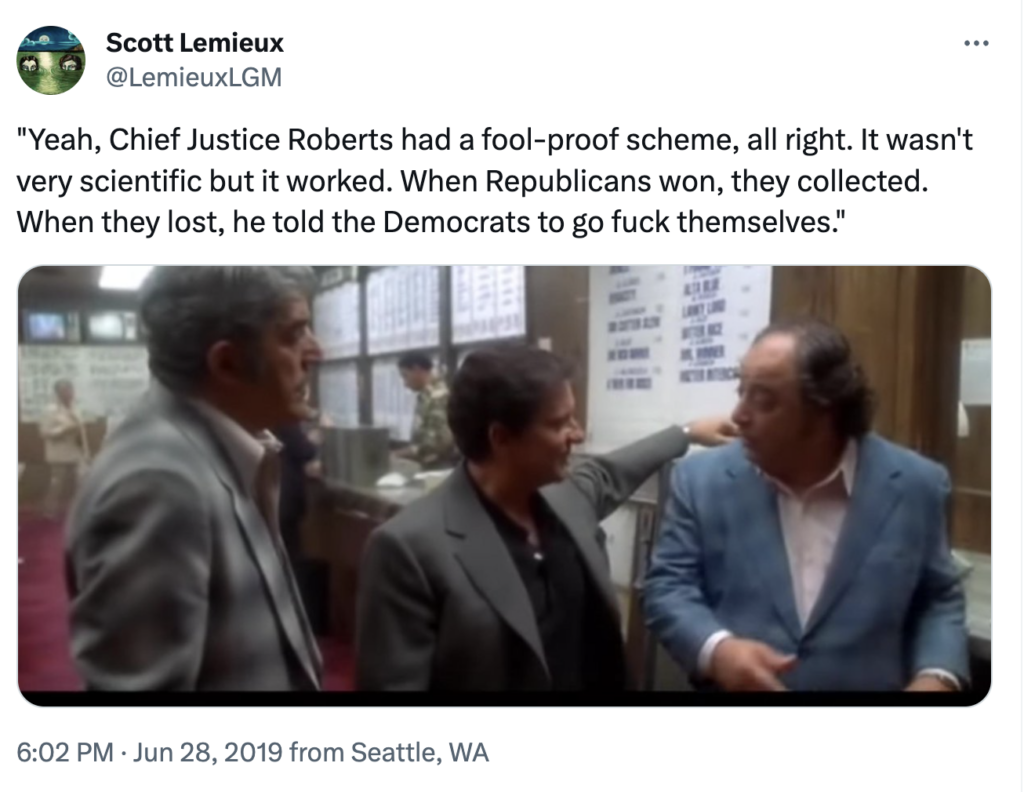Supreme Court Republicans to rule that states can do racial gerrymanders as long as they are also anti-democratic

The Court’s decision to strike down Alabama’s naked racial gerrymander earlier this year always figured to be a classic case of John Roberts’s symbolic minimalism — at best, an isolated case that states would very easily be allowed to work around. It sure didn’t take long for the anti-democratic partisanship that is the central value of the Republican justices to manifest itself again:
But while Milligan suggested that the Court may be turning away from its hostility to voting rights claims, Wednesday’s argument in Alexander suggests that Milligan could be a one-off.
Many of the GOP-appointed justices spent that argument probing for flaws in the evidence the Alexander plaintiffs raised in the lower court — evidence which shows that race, and not just partisanship, shaped South Carolina’s gerrymandered maps.
While Leah Aden, the lawyer representing those plaintiffs, was at the podium, Justice Samuel Alito behaved like a lawyer for the Republican Party who was cross-examining a hostile witness. He peppered her with questions about whether her side’s expert witnesses used an airtight methodology, and whether the Court should impose new legal requirements on lawyers challenging racial gerrymanders.
Though no justice was as aggressive an advocate for the Republican gerrymander as Alito, he was joined in his questions by Kavanaugh, who repeatedly brought up a white Democratic area that was excluded from the First District, seemingly to suggest that race was not the driving force behind this gerrymander.
There are strong rebuttals to these attacks on the lower court’s factual findings. As Justice Elena Kagan pointed out, the evidence shows that Black Democrats were excluded from the First District at a higher rate than white Democrats. There was also evidence that South Carolina’s mapmakers had to rely on racial data to draw a Republican gerrymander, because it did not have sufficiently reliable data on voters’ partisan preferences to gerrymander the First District without using race as a proxy to identify Democrats.
And, under the clear error rule, it shouldn’t matter whether Alito or Kavanaugh can find flaws in the plaintiffs’ evidence. All that matters is whether the trial court, after looking at all of the evidence in the case, could “plausibly” conclude that the evidence on the plaintiffs’ side was stronger than the state’s evidence.
Meanwhile, some other GOP-appointed justices suggested ways to change the law so that South Carolina will win. Alito and Justice Neil Gorsuch, for example, both suggested that the voting rights plaintiffs should have to produce “alternative maps” that achieve the state legislature’s partisan goal without engaging in racial gerrymandering — effectively requiring the plaintiffs to draw a partisan gerrymander. That would mean that, even if these plaintiffs prevail, Alito and Gorsuch’s Republican Party will retain control of the First District’s US House seat.
Roberts, meanwhile, complained that the lower court relied on “circumstantial evidence,” such as the fact that so many Black voters were moved out of the First District, and the fact that the state did not have reliable partisan voter data, rather than “direct evidence” such as a lawmaker’s admission that the maps were drawn with racist intent. Roberts even suggested that allowing someone to challenge a gerrymander without direct evidence “would be breaking new ground in our voting rights jurisprudence.”
So it sure looks bad for the Alexander plaintiffs, and for voting rights advocates more broadly. It is still possible that the Court will surprise observers in the same way it surprised us in the Milligan case. But, for the GOP-appointed justices, the biggest question in Alexander appears to be whether they should toss out the lower court’s factual findings, or whether they should announce a new legal rule that will permanently hobble all future plaintiffs’ ability to challenge racial gerrymanders.
This was predictable, given Roberts’s performance at oral argument in the Rucho case — one of the worst ever handed down by his un-eminent tribunal — which is excerpted below:
Saying that some but not all gerrymanders are “political questions” really gives away the show, but for authoritarians naked bad faith is more feature than bug. What good is power if it can’t be exercised arbitrarily?


